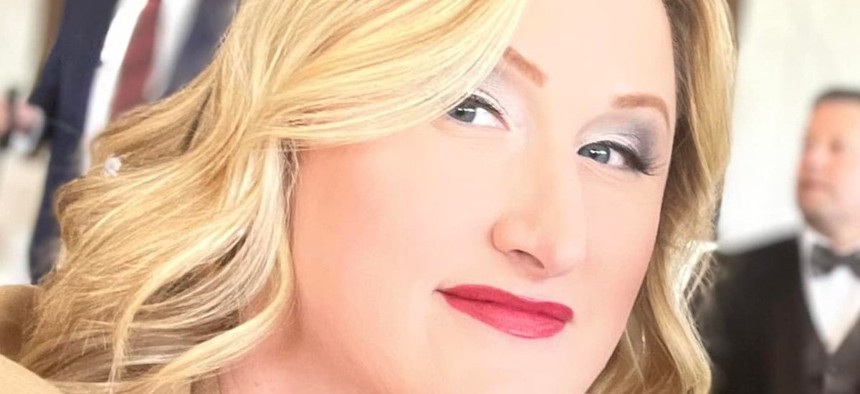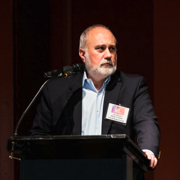Cancer diagnosis, loss of a spouse bow but don’t break this Florida lawyer
Alexis Fowler handles recent tragedies with wit and poise, says ‘some mysteries are not for us to understand’

Alexis Fowler Alexis Fowler
A sudden diagnosis of cancer followed by the death of a spouse after being married for less than a year would have crushed many people. Alexis Fowler, however, persisted. This is what it took: A combination of faith and a sense of the absurd.
“I believe that there are some mysteries that are not for us to understand,” says Fowler, a native Floridian and longtime local and state government attorney – she’s worked in Gov. Rick Scott’s legal office and at the Florida Lottery – who now works for Moffitt Cancer Center. “I was just a regular person going about my business and a bunch of crazy stuff happened to me in a relatively short period of time.”
She’s not all dry wit and sangfroid: “I have seen Alexis break down, but that's because I am one of her best friends,” says Ryan Wiggins, a Pensacola political strategist who’s currently chief of staff for The Lincoln Project, the high-profile anti-Trump group. “She’s a fierce friend who, despite everything, stays strong for everyone else. … She went through a lot of raw, awful things that would have broken most people. And I think it really speaks to her strength that it didn't break her.”
How did she get here? In 2018, Fowler says she woke up one morning feeling nauseated and exhausted for no apparent reason. Bear in mind, she points out, she was in “really, really good physical shape at the time,” including being a power yoga enthusiast.
Two weeks later, doctors told her she had stage 3 cancer. “Genetic, but not inherited. So I began treatment,” she recalls. “The mixed blessing of getting cancer as a young person is that it's treatable and curable but they also just throw everything at you: Some really nasty meds, some incredibly invasive surgery and, you know, ‘everything sucks for a year’ is sort of the tl;dr version of it.”
Her illness transformed her into an advocate for changing state law. Lobbyists and consultants offered financial help to defray co-pays, travel and other expenses not covered by her health insurance, but she had to turn them down. As an expert on the state’s Sunshine Laws, she knew such contributions would run afoul of the ban on gifts from lobbyists, which covers many state employees as well as lawmakers.
While undergoing months of treatment, she came up with the idea for a bill in 2020 that would allow state workers and their children to accept donations to help pay for out-of-pocket medical costs from serious illnesses, such as cancer. “She was trying to be inspirational even when she was on death's door,” Wiggins says. “She was trying to use her story to help others.”
Then-Sen. Rob Bradley and Rep. Jayer Williamson sponsored the legislation, which passed the state Senate unanimously that year but died in the House. “I agree with the gift ban 100%, but I also think this should be an exception,” says Williamson, a three-term House member who is not running for reelection this year. “It was also worthwhile in case we had another state worker in the future that had medical expenses and had people that really wanted to rally around them to help them out. They shouldn't be banned from doing that.”
Fowler finished treatment in June 2019, wound up bald and covered in scars, and in early menopause, which she quips “made me a total blast in social situations.”
That’s when a classmate from law school at the University of Florida showed up in Tallahassee looking for a job, part of hitting the reset button on his life. They were friends of friends then; maybe they had exchanged a dozen words.
The former law school classmate, Gene Fowler, was covered in scars in his own way. He had been a tax attorney, working in the private sector in Washington, D.C., and San Francisco and briefly in Jacksonville, his hometown. He had just ended a short but disastrous marriage and was done with Big Law, and moved to Tallahassee to start over. He landed a gig as an appellate court law clerk, Fowler says, because it was “just like being a law student, which he was really good at.”
But “it never occurred to me that I was going to date after cancer anytime soon,” she says. “Like, I didn't look like myself. I didn't feel like myself. And then all of a sudden, there's this guy who's seen it all. My hair had started growing in but I looked like Pat Riley with lipstick. … I was not trying to enter the dating marketplace. And soon, this guy's asking me my ring size, and I'm like, ‘What is wrong with you? I am a five-alarm dumpster fire.’” She laughs. “We fell in love under utterly bizarre circumstances. And next thing you know, we were planning our elopement.” They got married Nov. 14, 2020.

The COVID-19 pandemic helped them bond as both decided to work from home. After 10 months of marriage, another crisis happened. They had been sick with flu-like symptoms, both coming back from Jacksonville after the death of his mother, who had been in hospice care. The couple was getting ready to move his father into assisted living because he had been dealing with dementia for several years.
The next morning, he was “coughing really, really hard and asked for his inhaler,” she says. “He was drenched in sweat from head to toe. And I just said, ‘I'm calling an ambulance.’ So I was on the phone with the dispatcher. I got him out of bed and got him sitting upright in the living room.
“That’s where I lost his pulse.”
The EMTs arrived at the house within minutes, she recalls, but they never found a pulse either. Fowler says he’d had an undiagnosed heart condition. “The last thing he saw was me taking care of him, which I think is a good thing. And he probably had no idea what was going on.
She was on the phone with a friend after he left in an ambulance. She remembers saying, “I don't know … I might be a widow.” And then 15 minutes later, she learned that she was, “which just made absolutely no sense.”
Insurance executive and friend Christine Ashburn lives two blocks from their house. “I heard the siren,” she recalls. “She called me while he was in the ambulance. I got there and I looked at her and said, ‘God never gives us more than we know how to handle. And he must think you're really freaking strong.’ ”
Her friends “mobilized like the Marines,” Fowler says. Within hours, they were on her doorstep bringing food. Her house was a smorgasbord of Greek diner food here, Southern casseroles there, with an excess of Jewish deli favorites. Fowler recalls, “My mother's going, ‘Is there a shortage of bagels in New York? Because I think they're all here.’ ”
After crafting his obituary, she was in shock for weeks afterward, so alarmingly calm and organized to the point that it freaked out her friends: “They were waiting for me to have the wailing meltdown and it just didn't happen. I think biology just kind of did me a solid by not letting me process it all at once. Here I am, 42 years old, I finish cancer treatment, I get married and all of a sudden that guy dies on me. Like, what is this?”
About a month after her husband’s death, she saw that Moffitt – a nonprofit cancer treatment and research center in Tampa – was looking to hire a government relations attorney. She knew she’d be a fit for the job, in part because she has “some skin in the game on the whole cancer thing.”
The new job “makes a lot of sense for her,” says Ashburn, chief of communications, legislative and external affairs for Citizens Property Insurance Corp., the state's insurer of last resort. “She's a survivor. Whether you believe in God, He believed she could handle it. Most of us would collapse under what she's been through.”
Fowler adds that she’s a practicing Christian but believes “that a relationship with God is not a transaction. You don't put good things into a bank account somewhere so that you can then take good things out later.”
